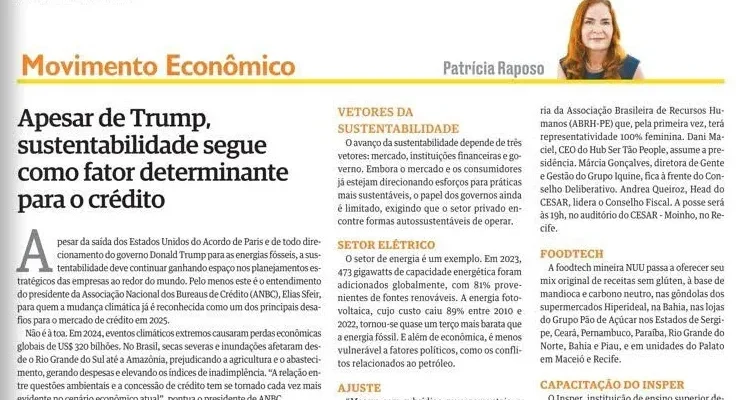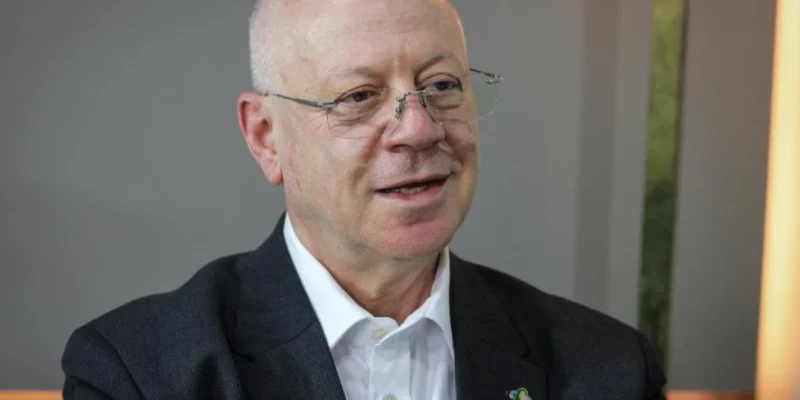Source: Folha de Pernambuco | By Patrícia Raposo
Despite the United States' withdrawal from the Paris Agreement and the Donald Trump administration's focus on fossil fuels, sustainability must continue to gain ground in the strategic planning of companies around the world. At least this is the understanding of the president of the National Association of Credit Bureaus (ANBC), Elias Sfeir, for whom climate change is already recognized as one of the main challenges for the credit market in 2025.
No wonder. In 2024, extreme weather events caused global economic losses of US$ 320 billion. In Brazil, severe droughts and floods affected everything from Rio Grande do Sul to the Amazon, damaging agriculture and supplies, generating expenses and raising default rates. "The relationship between environmental issues and the granting of credit has become increasingly evident in the current economic scenario," points out the president of ANBC.
Sfeir says that companies that don't adhere to sustainable standards face greater difficulties in obtaining credit and points out that "sustainability is linked to the sustainability of operations, and sustainability is the basis of trust in credit. Without this, there is no stability for borrowers and suppliers".
The insurance industry has been using environmental criteria for decades, assessing risks such as floods and other climatic disasters. This experience reinforces the importance of integrating sustainable practices into financial management.
VECTORS OF SUSTAINABILITY
Advancing sustainability depends on three vectors: the market, financial institutions and the government. Although the market and consumers are already directing efforts towards more sustainable practices, the role of governments is still limited, requiring the private sector to find self-sustainable ways of operating.
ELECTRIC SECTOR
The energy sector is a case in point. By 2023, 473 gigawatts of energy capacity had been added globally, with 81% coming from renewable sources. Photovoltaic energy, the cost of which fell by 89% between 2010 and 2022, has become almost a third cheaper than fossil energy. And as well as being economical, it is less vulnerable to political factors such as oil-related conflicts.
ADJUSTMENT
"Even without government subsidies, the market has found ways to adjust to environmental requirements. This demonstrates the economic viability of the energy transition," says Sfeir.
ABRH-PE WITH NEW BOARD
The new board of the Brazilian Association of Human Resources (ABRH-PE) will be sworn in on Thursday and, for the first time, it will have 100% female representation. Dani Maciel, CEO of Hub Ser Tão People, takes over as president. Márcia Gonçalves, Director of People and Management at the Iquine Group, is in charge of the Board of Directors. Andrea Queiroz, Head of CESAR, leads the Fiscal Council. The inauguration will take place at 7pm in the auditorium of CESAR - Moinho, in Recife.
FOODTECH
The Minas Gerais-based foodtech company NUU is now offering its original mix of gluten-free, cassava-based and carbon-neutral recipes on the shelves of Hiperideal supermarkets in Bahia, in Grupo Pão de Açúcar stores in the states of Sergipe, Ceará, Pernambuco, Paraíba, Rio Grande do Norte, Bahia and Piau, and in Palato units in Maceió and Recife.
INSPER TRAINING
Insper, a higher education institution dedicated to teaching and research, will offer training from January 27 to February 2, at Ademi-PE's headquarters in Espinheiro, on the theme "Housing Policies: Results and Challenges". The initiative is run by the State Secretariat for Development and Housing and made possible by Ademi-PE.


